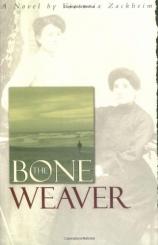Excerpt
Excerpt
The Bone Weaver: A Novel

Chapter One (Topanga Canyon, Spring 1984)
Mimi tried on every suit in the closet before settling on the blue wool gabardine. A passion purchase, Sarah had called it, but the blue always reminded Mimi of the gentians that refused to bloom for her in the parched southern California climate. A bitter aftertaste of coffee rose in her throat; patches of perspiration were already staining her silk blouse. She pulled on the skirt. Its underslip became snagged in the zipper and she made a little sound. A cry of alarm, she called it, but Sarah had always insisted it was more a bleat.
Sarah. How would she live without her most loving friend? The question caused her eyes to burn. Ordering herself to be calm, she examined the zipper, made one abrupt manipulation, rotated the skirt back into place, snatched up its matching jacket and rushed from the house.
Plowing through the traffic with tight-jawed determination, Mimi achieved the forty-minute drive between Topanga and her mother's apartment in less than thirty, numbed by the realization that she had made this journey with no recollection of having driven here. But then, surviving on the Ventura Freeway in a state of mental paralysis was child's play compared to what awaited her upstairs.
Just keep calm, she told herself. And for God's sake, try to be nice. It was a mantra Mimi had been chanting to herself for years and it was no coincidence that she was most often parked in this very spot when chanting it.
It took some energy to climb from the car, follow the line of junipers leading to the foyer, and then take the stairs to the second floor. Pausing on the landing, Mimi considered how much the building reminded her of an aging woman trying desperately to retain a semblance of youth. Not so unlike myself, she reflected. Stepping into the hallway, she was immediately hit with the odors of pollo con arroz and enchiladas. Once upon a time it had been blintzes, knishes, and mandel broite, but that was more than twenty-five years ago, when she had lived with her parents in their two-bedroom apartment on the third floor. It was a time when daughters lived at home until they were married, passing their time and learning those necessary household functions that, once mastered, identified them as a serious matrimonial prospect. By the age of twenty-six, however, Mimi figured she had waited long enough and one fine day, accompanied by two suitcases of clothing, fourteen cartons of books, and one leather-bound doctoral thesis, she moved to her own apartment in West Los Angeles. She had prayed mightily for a peaceful exodus, but Sarah's analysis had proven correct: That as long as Rivka Zilber lived, her daughter might be allowed to fold her tent, but she would never be able to steal silently away.
"Mama," called out Mimi, letting herself in. "Are you nearly ready?" When she saw her mother emerge from the kitchen, wearing robe and slippers, she nearly exploded. "You're not dressed. You haven't even started!"
Shuffling toward the bedroom, Rivka patted her only child on the arm. "Miriam," she responded. "I'll be ready when I'm ready."
Mimi felt the headache begin. "I specifically said I wanted to get there early."
"Early, a little after," came the voice from the bedroom. "We'll get there."
Mimi rubbed the space between her eyebrows. When she spoke, her voice was so calm it was nearly flat. "If you are not ready in five minutes, I will leave without you." No way in hell was her mother going to make her late. Entering the bedroom, she found the elderly woman standing before the opened closet, arthritic fingers sliding one plastic hanger after another along the rail. She'll choose the black wool, thought Mimi glumly.
Rivka came to the black wool, nodded decisively, and removed it from the closet. It was the outfit she always wore to funerals. Simple, austere, appropriately funereal. "Why not have a cup of tea?" she asked, laying the suit out on the bed.
"I don't want a cup of tea," Mimi grumbled. Any other time she might have chastised herself for this tone of voice, but not today. Today she was angry, dejected. How else could she feel, with Sarah being buried in less than an hour and her mother not yet dressed and wanting her to sit down for a damned cup of tea!
"Darling," Rivka informed her, traces of the Russian accent still lingering in the elongated first syllable, the clipped "ink" sound of the second. "Have a little patience for your old mother."
The flopping of bedroom slippers across carpet caused Mimi to grind her teeth. Any chagrin she might have felt was eclipsed by the clatter of water flowing into the tub. Rivka Zilber's baths were legend. "Longer than the Peloponnesian War, which went on forever," her father liked to tease. Today, it was not so funny. Working to bite back the anger, Mimi followed her mother into the bathroom. "How would you feel," she challenged, "if I were the one who died and it were Sarah and her mother coming late to my funeral?"
Nowy Zycie, Spring, 1887
Malka Gershon leaned into the doorway and squinted the length of the road in hopes of catching sight of her husband. Drying her hands absentmindedly in the apron's folds, she turned to discover the neighbor's horse ambling toward her vegetables. "Shoo!" she hissed, flapping the apron toward the mare. The beast turned her slow gaze in Malka's direction, took a leisurely nibble of greens, as if settling any question regarding proprietorship and clip-clopped away.
Malka knew how Grischa savored his walk home, how he used this time for reflection, for throwing off the day's tension. "If for no other reason," he insisted, "than to save my family from my bad humor." And in the latter part of the nineteenth century, with czarist policies stifling Jews throughout eastern Europe, there was bad humor to go around.
"Bad humor?" their daughter, Fredl, had responded. "Papa, you're the least ill-humored man I've ever known!" At sixteen, she had known very few.
Malka swatted at a fly buzzing near her face. Their children were due for lunch, so where was he? Meandering alongside that silly field, no doubt. What was it he had announced the last time she had accompanied him back to the store? That he could smell not only the fragrance of the vegetation, but their shapes and colors as well! Malka could barely suppress a scoffing retort.
Rubbing absentmindedly at a painful cuticle protruding from her thumb, she stomped back into the kitchen. "Foolish man," she mumbled, and then her face softened. Foolish, perhaps, but it had been his trusting nature-his belief that everything and everyone bad could be changed for the good-and his love for family and community that had convinced her parents what a good match he would be. A healthy balance, was how her mother had described it. Even a girl of seventeen understood this to be a
not-so-oblique reference to her own unyielding nature.
Malka slipped the bread dough into the oven and checked on the simmering beets, the memory of that last walk lingering with her. "And can you tell me, my dear wife," Grischa had concluded, waving an arm toward his beloved countryside. "Who enjoys better fortune than a simple man living in the heart of such beauty?"
"I dare you to repeat that after the next pogrom," she'd nearly declared. But before she could speak, a colorful mass of birds rose from the field and flapped skyward, like a handful of pebbles cast by a farmer clearing his land. The joyful expression on Grischa's face had silenced her for the remainder of their walk.
Malka retrieved the earthenware jug from the porch and carried it down two steps, to the dirt path alongside the house. Grischa had begged her to get one of the girls to help, but his wife would hear nothing of it. She wasn't that old yet! Hoisting the jug onto the hook Grischa had fashioned for her, she pumped the handle until the vessel was near to overflowing. Hauling it with difficulty to the kitchen, Malka set about preparing a stock for the soup. It had occurred to her more than once that the calm her husband gleaned from that simple field was the same calm she enjoyed while cooking. She forced herself to focus on the herbs and spices, adding just enough to camouflage the too-lean chicken. Stirring, she slowly let go of her concerns about the stifling new laws limiting ownership of land, her worries about the deterioration of their daily lives. And the pogroms? The only real question was when, not if. Her escape was to cook, make everything around her seem lighter, more positive. A home could be replaced and their children could even leave Nowy Zycie. As for the business: it provided the basics.
Of the several dry goods stores in Nowy Zycie, theirs was the most successful. "If you don't find it at Gershon's," people said, "then you'll have to wait until your next trip to Warsaw." Such exclusivity should have diminished Malka's concerns, but it didn't, because something as simple as a neighbor owing a few kopecks and requesting an extension of credit could make her stomach roil. Grischa's lack of concern amazed her. "But why should I worry," he often teased, "when you do it for me?" And if her concerns more often than not fell on deaf ears, so, too, did her husband's attempts to assuage them. She had lived long enough to see the dangers in poverty. As for corruption, watching a fortune in currency pass from shtetl pocket to the greedy hand of some official had taught Malka that it took more than honest work to achieve results. Try as she did, she never could understand Grischa's humor. Was there anything funny about insufferable taxes that induced neighbors to pack their meager belongings and flee? Of course, they could stay and refuse to pay, but the few stalwarts making this choice had been driven to their knees. The problem was that with taxes and pressure growing, Malka saw no option short of raising prices. She and Grischa had argued the point that very morning.
"And force our friends and neighbors to absorb the burden?" was Grischa's response, understanding very well that to hold prices steady meant taking the blow. He saw the flash of anger tighten Malka's mouth and his tone softened. "As long as we can remain in business," he reassured her, "we will survive. None of us will starve." His wife took it no further, knowing that even if the discussion continued beyond his limit of forbearance, the man would refuse to budge.
Excerpted from The Bone Weaver © Copyright 2012 by Victoria Zackheim. Reprinted with permission by Elton-Wolf Publishing. All rights reserved.
The Bone Weaver: A Novel
- paperback: 264 pages
- Publisher: Elton-Wolf Publishing
- ISBN-10: 1586190210
- ISBN-13: 9781586190217


